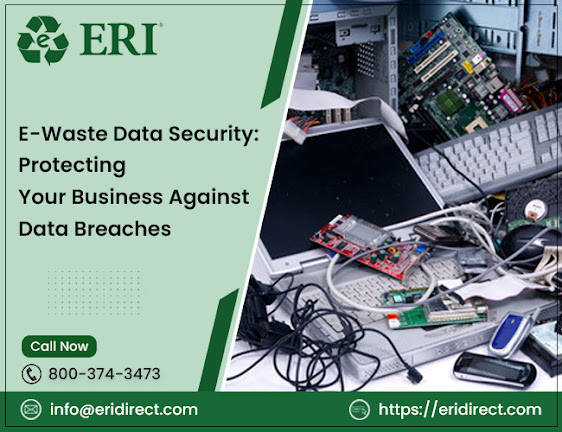In today's digital world, businesses generate an enormous amount of electronic waste, including outdated computers, servers, and other electronic devices. With the rise of cyber attacks, it has become crucial to ensure proper electronic waste data destruction to protect sensitive business data from falling into the wrong hands. This blog will discuss the importance of proper e-waste data security and the benefits of server decommissioning services and lithium-ion battery recycling.
Importance Of Electronic Waste Data Destruction
 When electronic devices are not disposed of correctly, they can pose a significant threat to your business's data security. Many businesses make the mistake of leaving sensitive data on old devices and then simply tossing them in the trash. Unfortunately, this is not an effective method of data destruction and can lead to data breaches.
When electronic devices are not disposed of correctly, they can pose a significant threat to your business's data security. Many businesses make the mistake of leaving sensitive data on old devices and then simply tossing them in the trash. Unfortunately, this is not an effective method of data destruction and can lead to data breaches.
Data breaches can be extremely costly and damaging to your business's reputation. In fact, the average cost of a data breach is over $3.8 million, which can be a devastating financial blow to any company. To avoid the risk of a data breach, it is essential to prioritize electronic waste data destruction.
Server Decommissioning Services
Server decommissioning services are designed to help businesses dispose of their outdated servers safely. These services involve a team of experts who will disconnect and remove the server equipment from your premises. They will then transport it to a secure facility where the data will be wiped clean and destroyed.
Server decommissioning services offer several benefits to businesses, including:
- Secure Data Destruction - Data on outdated servers can be a significant security risk. Server decommissioning services ensure that all data is securely destroyed, so there is no risk of a data breach.
Cost Savings - Decommissioning servers can be a time-consuming and costly process. By outsourcing the task to a professional service, businesses can save both time and money.
Environmentally Responsible - Server decommissioning services also provide environmentally responsible disposal of electronic waste. They will ensure that all equipment is recycled or disposed of in a way that minimizes its impact on the environment.
Lithium-Ion Battery Recycling
Another important aspect of electronic waste disposal is lithium-ion battery recycling. Lithium-ion batteries are commonly used in many electronic devices, including laptops, smartphones, and tablets. However, these batteries can be dangerous if not disposed of properly.
Lithium-ion batteries can explode or catch fire if they are damaged or exposed to extreme temperatures. This can pose a significant risk to anyone who comes into contact with them, as well as the environment. To avoid these risks, it is crucial to properly dispose of lithium-ion batteries.
Lithium-ion battery recycling is an effective method of disposing of these batteries safely. Recycling companies will collect and transport the batteries to a facility where they will be dismantled and separated into their individual components. The materials can then be reused in new batteries or other electronic devices, reducing the amount of electronic waste in landfills.
Conclusion
Electronic waste data destruction is a critical aspect of protecting your business's data security. By utilizing server decommissioning services and lithium-ion battery recycling, businesses can ensure that all electronic waste is disposed of safely and responsibly. This not only protects sensitive business data but also reduces the impact of electronic waste on the environment. As a business owner, it is essential to prioritize proper electronic waste disposal to ensure the long-term success of your company.

